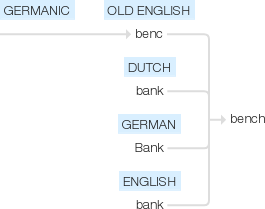Bench
Old English benc, of Germanic origin; related to Dutch bank and German Bank, also to bank1.
wiktionary
From Middle English bench, benk, bynk, from Old English benċ(“bench”), from Proto-West Germanic *banki, from Proto-Germanic *bankiz(“bench”), from Proto-Indo-European *bʰeg-. [1]
Cognate with Scots benk, bink(“bench”), West Frisian bank(“bench”), Dutch bank(“bench”), German Bank(“bench”), Danish bænk(“bench”), Swedish bänk(“bench”), Icelandic bekkur(“bench”). Doublet of bank.
From bench press by shortening.
See bentsh.
etymonline
bench (n.)
Old English benc "long seat," especially one without a back, from Proto-Germanic *bankon(source also of Old Frisian bank "bench," Old Norse bekkr, Danish bænk, Middle Dutch banc, Old High German banch). The group is cognate with bank (n.2) "natural earthen incline beside a body of water," and perhaps the original notion is "man-made earthwork used as a seat."
Used from late 14c. of a merchant's table. From c. 1300 in reference to the seat where judges sat in court, hence, by metonymy, "judges collectively, office of a judge." Hence also bencher "senior member of an inn of court" (1580s). Sporting sense "reserve of players" (in baseball, North American football, etc.) is by 1909, from literal sense of place where players sit when not in action (attested by 1889). A bench-warrant (1690s) is one issued by a judge, as opposed to one issued by an ordinary justice or magistrate.
bench (v.)
"to take out of a (baseball) game," 1902, from bench (n.) in the sporting sense. Earlier it meant "to display (a dog) in a dog show" (1863). Related: Benched; benching. Old English had a verb bencian, but it meant "to make benches."
